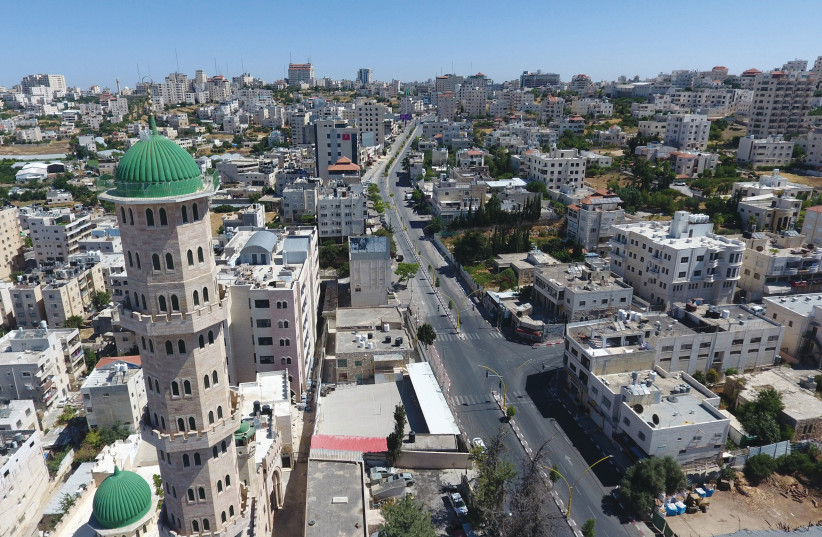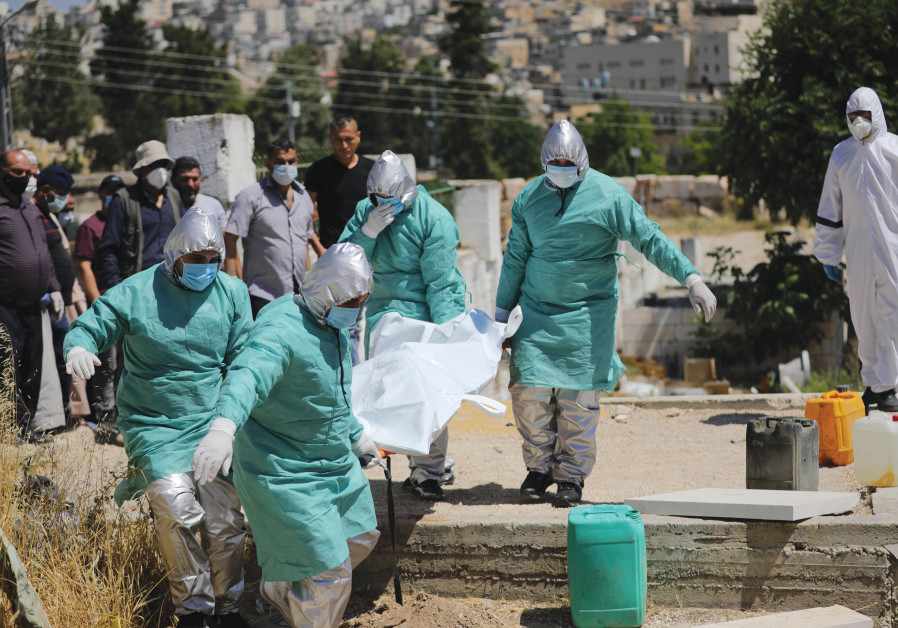Why is Hebron seeing speedy coronavirus spread?
 Hebron has become the epicenter of the coronavirus in the West Bank, accounting for 80% of the more than 5,800 cases of the illness, amid tensions between the Palestinian Authority and the tribes and families of the city over its adherence to the lockdown and other preventive measures.
Hebron has become the epicenter of the coronavirus in the West Bank, accounting for 80% of the more than 5,800 cases of the illness, amid tensions between the Palestinian Authority and the tribes and families of the city over its adherence to the lockdown and other preventive measures.
“This agreement resulted in the oppression of the city and its people and divided it into two cities, and since H2 is under Israel’s control and the latter neglects this area and the Arab citizens there, it has become a haven for all sorts of outlaws,” he said.
Abu Sneineh explained that while the PA had placed H1 and all other Palestinian cities under lockdown to stem the spread of the coronavirus, H2 was open, and the people there were going about their lives as usual.
“Not to mention that the PA has lost some of its authority in the Palestinian territories because of a variety of political circumstances.... Therefore it couldn’t impose and implement its orders and instructions with the people without first coordinating them with the resident families and tribes,” Abu Sneineh said.
By the time the PA was able to reach an agreement with the tribes, the outbreak had spread out of control, he said.
“In the final analysis, we need to find ways to cope with the epidemic, and when we decide to impose a full closure, we need to compensate the citizens, but we can’t pay their salaries, and we don’t have the financial resources to help the people and support them financially.”
Abu Sneineh warned that a variety of actors were taking advantage of the deteriorating epidemiological situation to incite against the PA, promote their own agendas and highlight the failure of the PA and its lack of capabilities.
“These parties don’t really understand the dangers and the seriousness of the situation, when great powers such as the US, with its vast resources, have been unable to limit the spread of the virus,” he said.
About 800 Jews live among 215,000 Palestinians in Hebron. At the center of the Old City is the traditional burial place of Abraham, which Palestinians call the Ibrahimi Mosque, and Jews and Christians, the Tomb of the Patriarchs. Hebron, and the religious site in particular, has long been a flashpoint for Israeli-Palestinian violence.
In February 1994, during Ramadan, a Jewish settler gunned down 29 Muslims inside the mosque as they prayed. After that, Israel divided the holy site into two areas — half mosque and half synagogue – with separate entrances.
The governor of Hebron, Jabreen al-Bakri, announced on June 27 a full closure of the area, which has been extended until now, isolating it from the other 15 Palestinian governorates, and the cancellation of weddings and all other social events. Only trucks and other commercial vehicles are allowed entry.
Bakri warned in a statement that those who violated the decisions would be held accountable by traffic committees, which would monitor public and private movement to ensure compliance with the necessary safeguards and measures announced by the PA Health Ministry.
Clan and tribe are particularly strong in the Hebron community. From the period of Ottoman rule until now, successive rulers have recognized the important role and influence of the tribes and have tried to build relationships with them. This includes also the local Jewish community, whose rabbis have tried, mostly unsuccessfully, to build relationships with Palestinian tribal leaders.
 SUITED UP at a funeral for a COVID-19 victim in Hebron this month (Photo Credit: Noor Khatib)
AFTER THE Palestinian Authority was established through the Oslo Accords, it, too, tried to co-opt the tribes and clans by offering them privileges, but these bodies remain independent and more connected to political factions than to the PA itself.
Muhannad al-Ja’bari, a Fatah member representing central Hebron and responsible for Hebron’s Old City, told The Media Line, “The coronavirus pandemic showed the inability of the PA to operate in these areas [H2], and that’s when the role of Fatah and the tribes came into play.”
Ja’bari blamed the inability to control the virus in Hebron and especially in H2 on Israeli settlers.
“People were living a normal life; they had weddings and all kind of social events, and the tribes didn’t really cooperate with the PA until last week, after the virus had spread widely,” he added.
He added that because families and tribes underestimated the danger of the virus, “some of them didn’t believe that the pandemic existed in the first place.”
Ja’bari said that since the tribes decided to cooperate with the Palestinian leadership, they had distributed instructions telling their families to observe the preventive measures and the closure. “Therefore, [the virus in] these areas had started to come under control, not because of the PA’s orders, but because of their tribes’ orders.”
He pointed out that because Palestinian businesses in H1 were all closed, while those next door in H2 were all open, the merchants in the area under PA control felt they had been done an injustice.
“This has created a reaction among the people, especially after merchants who felt oppressed, incited against the PA and its measures. Thereafter, people went to the streets in large numbers.... In the final analysis, we can’t control the entire city. Realistically, all of our measures will remain limited,” Ja’bari said.
On July 5, PA President Mahmoud Abbas extended the state of emergency in the West Bank by 30 days, amid a five-day lockdown declared on July 3 that was subsequently extended by another five days, due to the spiraling number of new coronavirus cases.
The only exceptions during the lockdown are for pharmacies and grocery stores. Palestinians who cross into Israel for work will not be allowed back for the time being.
Osama Amr, the head of the Palestinian Businessmen Association, is from Hebron. He told The Media Line most of the Palestinian industrial economy was generated in two cities: Hebron and Nablus.
“Hebron is one of the large Palestinian cities that export many industrial products to Israel and elsewhere, with the majority of the exports coming from Hebron,” he said.
The complete closure of the city was doing tremendous damage to the Palestinian economy, “and that’s why we saw the citizens of Hebron protesting against stopping the manufacturing. They didn’t protest against the cancellation of weddings and social events, but rather against halting the production lines,” he said.
“The strategy of full closure of all Palestinian cities was negative; I believe they should have closed specific sectors and kept essential sectors working. There must be a balance between the economy and public health,” Amr said.
SUITED UP at a funeral for a COVID-19 victim in Hebron this month (Photo Credit: Noor Khatib)
AFTER THE Palestinian Authority was established through the Oslo Accords, it, too, tried to co-opt the tribes and clans by offering them privileges, but these bodies remain independent and more connected to political factions than to the PA itself.
Muhannad al-Ja’bari, a Fatah member representing central Hebron and responsible for Hebron’s Old City, told The Media Line, “The coronavirus pandemic showed the inability of the PA to operate in these areas [H2], and that’s when the role of Fatah and the tribes came into play.”
Ja’bari blamed the inability to control the virus in Hebron and especially in H2 on Israeli settlers.
“People were living a normal life; they had weddings and all kind of social events, and the tribes didn’t really cooperate with the PA until last week, after the virus had spread widely,” he added.
He added that because families and tribes underestimated the danger of the virus, “some of them didn’t believe that the pandemic existed in the first place.”
Ja’bari said that since the tribes decided to cooperate with the Palestinian leadership, they had distributed instructions telling their families to observe the preventive measures and the closure. “Therefore, [the virus in] these areas had started to come under control, not because of the PA’s orders, but because of their tribes’ orders.”
He pointed out that because Palestinian businesses in H1 were all closed, while those next door in H2 were all open, the merchants in the area under PA control felt they had been done an injustice.
“This has created a reaction among the people, especially after merchants who felt oppressed, incited against the PA and its measures. Thereafter, people went to the streets in large numbers.... In the final analysis, we can’t control the entire city. Realistically, all of our measures will remain limited,” Ja’bari said.
On July 5, PA President Mahmoud Abbas extended the state of emergency in the West Bank by 30 days, amid a five-day lockdown declared on July 3 that was subsequently extended by another five days, due to the spiraling number of new coronavirus cases.
The only exceptions during the lockdown are for pharmacies and grocery stores. Palestinians who cross into Israel for work will not be allowed back for the time being.
Osama Amr, the head of the Palestinian Businessmen Association, is from Hebron. He told The Media Line most of the Palestinian industrial economy was generated in two cities: Hebron and Nablus.
“Hebron is one of the large Palestinian cities that export many industrial products to Israel and elsewhere, with the majority of the exports coming from Hebron,” he said.
The complete closure of the city was doing tremendous damage to the Palestinian economy, “and that’s why we saw the citizens of Hebron protesting against stopping the manufacturing. They didn’t protest against the cancellation of weddings and social events, but rather against halting the production lines,” he said.
“The strategy of full closure of all Palestinian cities was negative; I believe they should have closed specific sectors and kept essential sectors working. There must be a balance between the economy and public health,” Amr said.
Rami al-Natshe, a retail merchant from Hebron, told The Media Line that his business was affected badly by the repeated closures, particularly because nearby areas remained open.
“Other merchants were able to open in some areas, so they took all my clients and livelihood.”
He said that traffic in the market has been greatly affected, particularly with the spread of news connecting the virus to the city.
“It is as if the city of Hebron was targeted for a reason. Everyone started saying that the city had become the epicenter of the viral outbreak, and people were very scared.”
 SUITED UP at a funeral for a COVID-19 victim in Hebron this month (Photo Credit: Noor Khatib)
SUITED UP at a funeral for a COVID-19 victim in Hebron this month (Photo Credit: Noor Khatib)Rami al-Natshe, a retail merchant from Hebron, told The Media Line that his business was affected badly by the repeated closures, particularly because nearby areas remained open.
Follow us on twitter (ajuede.com) or on Instagram (ajuedeman) for details of the global situation presently.





.jpeg)
Comments
Post a Comment